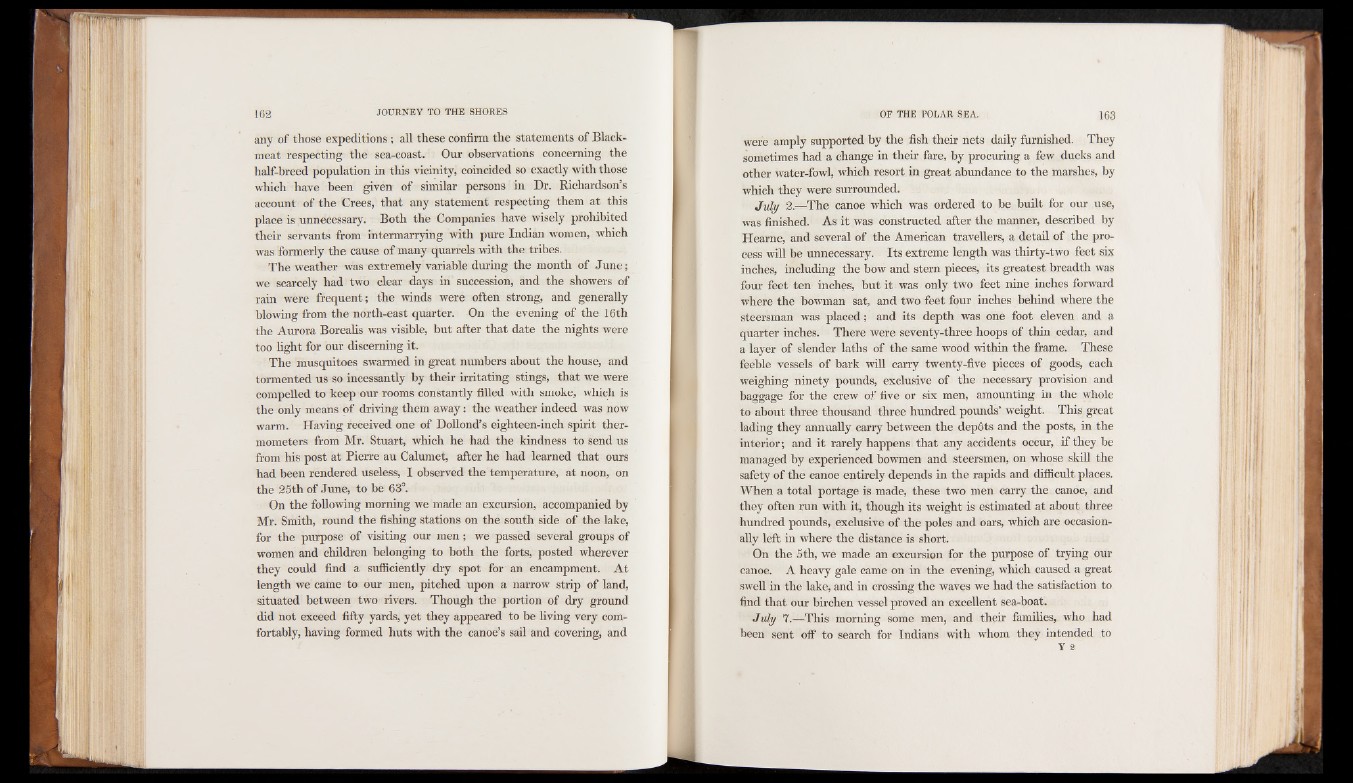
any of those expeditions ; all these confirm the statements of Black-
meat respecting the sea-coast. Our observations concerning the
half-breed population in this vicinity, coincided so exactly with those
which have been given of similar persons in Dr. Richardson’s
account of the Crees, that any statement respecting them at this
place is unnecessary. Both the Companies have wisely prohibited
their servants from intermarrying with pure Indian women, which
was formerly the cause of many quarrels with the tribes.
The weather was extremely variable during the month of June;
we scarcely had two clear days in succession, and the showers of
rain were frequent; the winds were often strong, and generally
blowing from the north-east quarter. On the evening of the 16th
the Aurora Borealis was visible, but after that date the nights were
too light for our discerning it.
The musquitoes swarmed in great numbers about the house, and
tormented us so incessantly by their irritating stings, that we were
compelled to keep our rooms constantly filled with smoke, which is
the only means of driving them away: the weather indeed was now
warm. Having received one of Dollond’s eighteen-inch spirit thermometers
from Mr. Stuart, which he had the kindness to send us
from his post at Pierre au Calumet, after he had learned that ours
had been rendered useless, I observed the temperature, at noon, on
the 25th of June, to be 63°.
On the following morning we made an excursion, accompanied by
Mr. Smith, round the fishing stations on the south side of the lake,
for the purpose of visiting our m en; we passed several groups of
women and children belonging to both the forts, posted wherever
they could find a sufficiently dry spot for an encampment. At
length we came to our men, pitched upon a narrow strip of land,
situated between two rivers. Though the portion of dry ground
did not exceed fifty yards, yet they appeared to be living very comfortably,
having formed huts with the canoe’s sail and covering, and
were amply supported by the fish their nets daily furnished. They
sometimes had a change in their fare, by procuring a few ducks and
other water-fowl, which resort in great abundance to the marshes, by
which they were surrounded.
July 2.—The canoe which was ordered to be built for our use,
was finished. As it was constructed after the manner, described by
Hearne, and several of the American travellers, a detail of the process
will be unnecessary. Its extreme length was thirty-two feet six
inches, including the bow and stern pieces, its greatest breadth was
four feet ten inches, but it was only two feet nine inches forward
where the bowman sat, and two feet four inches behind where the
steersman was placed; and its depth was one foot eleven and a
quarter inches. There were seventy-three hoops of thin cedar, and
a layer of slender laths of the same wood within the frame. These
feeble vessels of bark will carry twenty-five pieces of goods, each
weighing ninety pounds, exclusive of the necessary provision and
baggage for the crew of five or six men, amounting in the whole
to about three thousand three hundred pounds’ weight. This great
lading they annually carry between the depdts and the posts, in the
interior; and it rarely happens that any accidents occur, if they be
managed by experienced bowmen and steersmen, on whose skill the
safety of the canoe entirely depends in the rapids and difficult places.
When a total portage is made, these two men carry the canoe, and
they often run with it, though its weight is estimated at about three
hundred pounds, exclusive of the poles and oars, which are occasionally
left in where the distance is short.
On the 5th, we made an excursion for the purpose of trying our
canoe. A heavy gale came on in the evening, which caused a great
swell in the lake, and in crossing the waves we had the satisfaction to
find that our birchen vessel proved an excellent sea-boat.
July 7.—This morning some men, and their families, who had
been sent off to search for Indians with whom they intended to